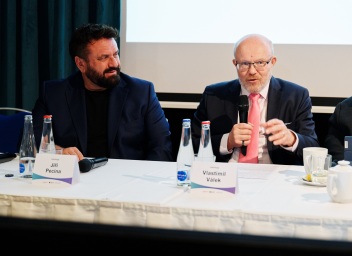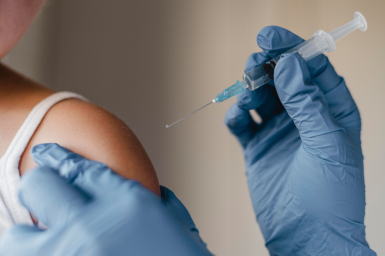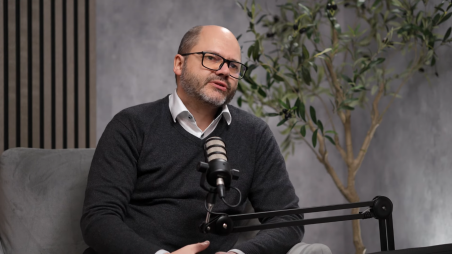The statistics are clear – cardiovascular disease is the number one killer in Europe. While it would be hard to find a government that does not agree that cardiovascular health needs to be addressed, not everyone sees it as a priority. Efforts to promote preventive measures in particular often run up against a lack of political will to do so. This is just one of the issues the heads of European cardiology societies, patient organisations and the Czech Minister of Health spoke about at the European Cardiology Conference organised by the Healthcare Daily on 20 June in Prague.
“Everybody is convinced about the importance of cardiovascular health but the main difficulty is if we as a cardiologists come and ask for something then they (the Ministry of Health) already think we want money for very expensive, innovative new tools… But what we actually want is for people to have healthier lives,“ described one of the obstacles that Rik Willems, as the newly elected president of the Belgian Society of Cardiology, encounters in negotiations. Referring to a report by the World Health Organisation (WHO) that found that population-based screening does not lead to a reduction in deaths from cardiovascular disease, he argued in favour of conducting targeted screenings. Data should then help to target them correctly. „We need a data warehouse to help us find target populations and define the problems we will change. That’s the main purpose we see at the moment,“ Willems said.

Przemyslaw Mitkowski, the President of the Polish Society of Cardiology, also spoke about the different understanding of the meaning of healthcare spending between experts and the Ministry of Health. „We have to convince both the Ministry of Health and the Ministry of Finance that when we put some money into the healthcare system, it is not money spent, but money invested,“ he stressed. „It is very important that we change the mind of our finance ministry in particular. If we can do that, it will bring success,“ Mitkowski believes.

Birgit Beger, the CEO of the European Heart Network, a society of patient organisations, agreed with his words. „You can’t rely on the Minister of Health to promote the idea of a healthy society. It has to come from the governance as a whole, and in particular, the Minister of Finance has to be convinced that it is actually good for the GDP,“ she said, highlighting the interconnection between population health and the economy. She took the covid pandemic as an example to support her argument, which brought about an economic crisis in addition to major damage to public health. Beger stressed that the current difficult situation is an ideal opportunity to raise awareness of the importance of health for both society and the economy. „We urgently need to convince finance ministers of this,“ she appealed.
Beger also reminded that EU programmes can help national states to invest in health. „The European Union has allocated eight times more money to the EU4Health programme than ever before… But we need to know what to do. This is the perfect background for the member states to knock on the door and say we need the EU to have a plan which distributes this eight times as much budget for health. It’s our chance. if we don’t use this time now and use this budget we’ve lost,” she added.

Czech Health Minister Vlastimil Válek responded to her words about money just being on the table and ready to be grabbed. „The government has no money of its own. The ones it has are actually taxes,“ he said, adding that governments have to consider what to do with a limited budget – whether to support education, build highways or improve healthcare. And when they put more money into one area, they inevitably have to cut from another. Still, Válek acknowledged the need for European health and education ministers to work together to take a common approach to prolong healthy living.
The President of the Croatian Society of Cardiology, Davor Milicic, also joined the discussion on the attention paid by the government to cardiology. „My experience is that we have no problem with financing curative cardiology. The government invests in everything, and everything is for free… But when we ask it to invest in prevention, that is a different story,“ he described, adding that he sees the reason for this difference mainly in the fact that politicians like quick results, while the benefits of investing in prevention will take longer than the election period. Milicic added that in such an environment, doctors then have to rely on grants from private companies to run prevention programs. „We get something from the government, but it is not nearly enough. Therefore, we rely on the support of the pharmaceutical industry and medical device companies,“ Milicic stated.

The area in which he said Europe is failing most in the field of cardiology is secondary prevention, i.e. early detection of disease that has already developed. Here, he said, money from European funds, which Beger mentioned, could help.

The President of the Czech Cardiological Society Petr Ošťádal also had something to say about prevention. „We should turn our attention from cardiovascular intervention to primary and secondary prevention. We should focus on the early detection of cardiovascular risk factors, their early treatment and on the promotion of lifestyle modification,“ he said, adding that there is much room for improvement in secondary prevention, similar to what his Croatian counterpart said. „It is evident that patients do not sufficiently adhere to secondary prevention measures,“ he added. Ošťádal also supported the creation of a European cardiovascular plan and the transfer of early detection programmes for risk factors or the creation of patient electronic information platforms from the national to the European level. „I think the implementation of these processes into daily practice can help a lot,“ he concluded.
Filip Krumphanzl







